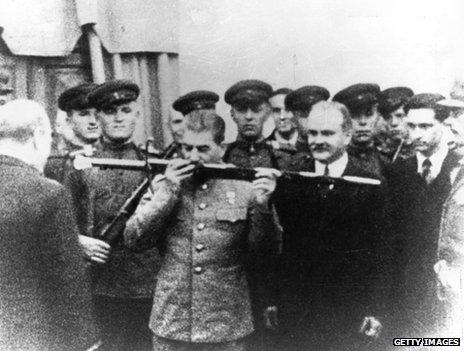Stalingrad name to be revived for anniversaries
- Published

Stalin is seen here receiving an honorary Sword of Stalingrad from British Prime Minister Winston Churchill in November 1943
The Russian city once known as Stalingrad is to regain its old name during commemorations of the famous World War II battle on Saturday.
It has been officially known as Volgograd since 1961, when it was renamed to remove its association with Soviet dictator Josef Stalin.
Its old name is inseparable from the ferocious battle won by Soviet forces 70 years ago this week.
Volgograd council has restored the name for six days a year.
The dates, all associated with military commemorations, are 2 February, 9 May, 22 June, 23 August, 2 September and 19 November.
According to the council, which is dominated by Russia's ruling United Russia party, the decision was taken after "numerous requests" from World War II veterans.
Critics have suggested the decision is a populist move aimed at boosting United Russia's popularity ahead of council (or city Duma, as it is officially known) elections in September.
Some have also objected to the use of Stalin's name again, worried about what they see as creeping attempts under President Vladimir Putin's rule to portray Stalin as a great war leader.
'Election issue'
Under the decision, passed by the council on Wednesday, the title "Hero City Stalingrad" will be used during commemorations as "a symbol of Volgograd".
"We may use this symbol officially in our speeches, reports and while conducting public events," the council ruling states.
Commenting on the decision, Russia's Komsomolskaya Pravda newspaper said the revived name would not appear in documents, but only on banners and posters.
A council deputy from opposition party A Just Russia, Oleg Mikheyev, said the move had a clear political aim.
"The Volgograd-Stalingrad issue comes up before every election, then drops back down when the election is over," he told the Russian news website Gazeta.Ru.
He added: "I think Stalingrad is already bigger than Stalin, it's the name of the city of the great victory, but this issue should be settled finally in a referendum."
Communists in the region say they have collected 35,000 signatures for a petition calling for Volgograd to be renamed permanently and plan to take their demand to court.
'Blasphemy'
The use of the name Stalingrad ("Stalin City") has dismayed some Russians because of its connection to the Soviet dictator whose rule saw the persecution of millions of people.
Nikolai Levichev, a Just Russia federal MP, said it was "blasphemous to rename the great Russian city after a bloody tyrant who had killed millions of his fellow citizens and caused irreparable damage to the nation's gene pool".
"The attitude towards Stalin was expressed in 1961, when Stalingrad was renamed Volgograd," he was quoted as saying by Russia's Interfax news agency.
Gamlet Dallatyan, a 92-year-old veteran of the actual battle, said he in no way condoned Stalin's repressions.
"But you have to recognise the positive things he did, whether you want to or not," he told Reuters news agency.
"It would be good to go back to the name of Stalingrad, though not so much because of Stalin himself but because that is how the city was known during the war."
The city has had three names during the past century. It was originally known as Tsaritsyn before being renamed in 1925 in honour of Stalin, who led Bolshevik forces there during the Russian Civil War.
- Published31 January 2013
- Published2 November 2012